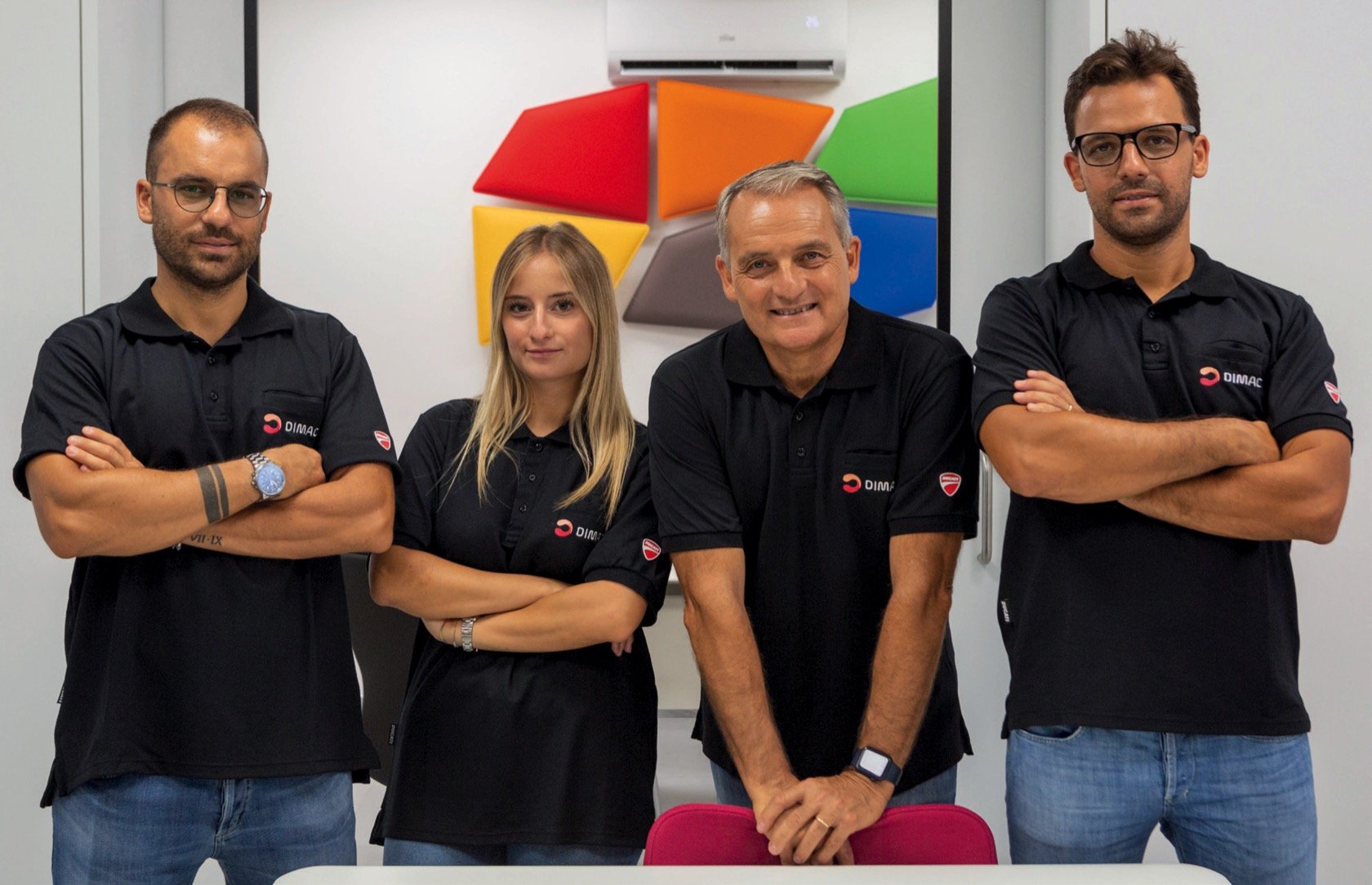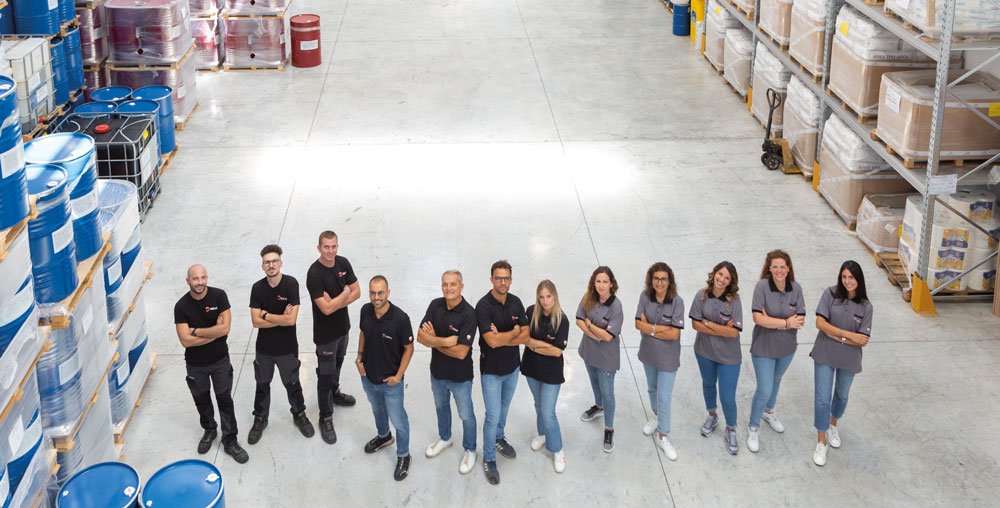THE BARLETTA-BASED COMPANY, LEADER IN THE PRODUCTION OF COLOURING PASTES AND ADDITIVES FOR PU AND IN THE COMMERCIALISATION OF POLYURETHANE
SYSTEMS AND TPU, IS ABLE TO PROPOSE CUSTOMISED PRODUCTS AND SOLUTIONS IN REAL TIME. IN MARCH IT OBTAINED QUALITY MANAGEMENT SYSTEMS CERTIFICATION.
The year 2024 represents an important ‘junction’ of strengthening and development in the market for Dimac from Barletta, which specialises in the production of colouring pastes and additives for PU and the marketing of polyurethane systems and TPU. Together with several partners, including some of the leading multinational corporations in the sector, the Apulian company offers a wide range of products and raw materials for various sectors, such as footwear, but above all, efficient technical and logistical support. There is also an important presence in the work & safety industry, where the technicians are true consultants offering customised solutions after having gained total knowledge of production processes and materials over the years. The current year has already brought important news: in March, the top management of Dimac was made official about obtaining Iso 9001 certification of Quality Management Systems, a very important recognition for the industry.
The story of Dimac is a fine business story, but also a family one, now in its third generation: it was Angelo Diterlizzi who founded an electromechanical company in the early 1980s – whose core business was centred on assisting shoe and upper manufacturers in the operation, assembly and disassembly of machinery for the manufacture of PU and PVC soles. He was later joined by his sons, including Francesco Paolo, currently at the helm with his three children, Fabrizio, Alessio and Roberta.
“Our strengths,” explained Francesco Paolo and Roberta Diterlizzi, whom we met at the Barletta headquarters, “are our services and assistance, that we guarantee quickly. A streamlined and versatile structure that is able to proceed with ‘tailor-made work’, adapting our product portfolio to the needs of the client. In particular, in terms of logistics we are very well organised, often as early as the day after the request, we are able to deliver the product to the customer anywhere in the country, while in the surrounding area we are able to respond to requests even within a couple of hours. This is one of the added values that footwear companies really appreciate, and it may often be complex to implement in large chemicals where production times and minimum orderable quantities are often higher than ours. On the other hand, due to our smaller company size, we have a more intimate contact with the companies and this allows us to get to know them more in depth: we approach the customer by listening to their needs and then proceeding with any small adjustments or corrections, which allow us to solve the problem and give the right answer.”
In what context do you operate in the market?
“We are to all intents and purposes a connecting company between some of the most important chemical multinational corporations and shoe manufacturers. We collaborate with market leaders who produce polyurethane systems and liquid colourants at 360 degrees, so the footwear industry is just one of the many applications they deal with. One of our tasks is precisely to connect the two ‘souls’: for us the footwear industry is relevant, as Apulia has been and still is an important district. Also due to a geographical matter, we know all our customers well and by visiting them we often know their technologies and needs very well.”
How important is the accumulated experience of Dimac over the years?
“Absolutely fundamental. Towards the end of the Seventies we started out as shoe machine repairers, so we knew all the technologies perfectly, then we always sold polyurethane, learning over time about every facet of it. Then we started to sell both liquid colourants for polyurethane and mould release agents, the latter also important for the finish of the final product. Ultimately, thanks to these four different skills, we know all the steps that are essential for a shoe factory to guarantee a quality product in a rapid timeframe. In other words, we know perfectly how a production machine works, how the components are mixed and how they react, this allows us to understand in real time what is happening and, if necessary, to intervene where required.”
What were the technical and commercial choices that led you over the years to becoming a partner of the top shoe manufacturers?
“We closely followed the developments in materials and realised that PVC, due to a series of problems, which were later partly solved, was gradually giving way to other materials. Eventually, in the 1990s, many of the big EU companies decided to phase out this material, in the meantime we had already moved on to polyurethane, its various combinations and its colouring process. Subsequently, we began to collaborate with some manufacturing partners of release agents, thereby completing our ‘package’ of products. We did a lot of research on polyurethane, and our intuition was to persevere and in the end the results proved us right. The most difficult things are those that see few entrepreneurs take risks, but in the end, they allow you to excel, very often we have been able to anticipate the market changes, arriving before everyone else.”
How are you currently organised at the Barletta headquarters?
“We have a covered facility of more than 1,000 square metres, plus additional space outside for heavy vehicles. All materials are regularly in stock in a large warehouse, which is another of our strengths. The procurement and storage of raw materials is carefully planned according to the purchasing forecasts of our clients. In this way, with our expertise and the implementation of a ‘just in time’ warehouse management programme, we are able to foresee what the needs of our clients will be before they are communicated to us, and therefore be ready to respond to requests in real time. Our motto is ‘from 1 kg to 1000 kg in 24 hours’, each requested product within 1-2 days at the most must reach the client, in Puglia we deliver the goods on the same day.”
How has your brand evolved in the 2000s?
“With the beginning of the new century, the market grew considerably, and it was time for us to evolve: Dimac became not only a representative but also a distributor of the Dow Italia and Repi brands, to which Evonik (for release agents and polyurethane additives) and Aipol (TPU) were added over time. Over the years, we have consolidated further and now work with all major international groups. Thanks to our decades-long relationship with Repi, we have become their trusted partner for both safety and other applications, excluding thermoplastics. In fact, in addition to the outdoor and safety sector, we also deal with fashion, following several footwear manufacturers. In 2014, Dimac sold the business unit dedicated to electromechanics, therefore being able to devote itself entirely to the sale of polyurethane and the distribution of colouring pastes and additives for PU/TPU’.
Aside from experience, what is your added value at the moment?
“Whoever chooses our company can count on professionalism and reliability. Over all these years, we have built an organised and reliable organisation, capable of satisfying client needs, guaranteeing high quality standards and responding to changes with courage and initiative. Our mission is to produce and market only products of excellence to meet the needs of our clients, while our vision is to be a specialist and a reliable partner.”

The Diterlizzi family, at the helm of DIMAC: Alessio, Roberta, Francesco Paolo and Fabrizio

